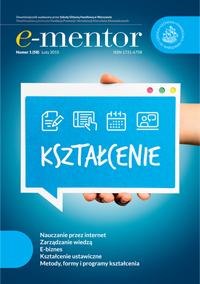Rozwijanie kompetencji społecznych na lektoracie w szkole wyższej
Methods of social skills training for foreign language teacher in higher education
Author(s): Anna J. PiwowarczykSubject(s): Essay|Book Review |Scientific Life
Published by: Szkoła Główna Handlowa w Warszawie, Fundacja Promocji i Akredytacji Kierunków Ekonomicznych
Keywords: social skills training; foreign language teaching; social competence; National Qualifications Framework; training methods; constructivist teaching; cycle of Kolb
Summary/Abstract: The paper discusses the foreign language teaching methodology at the university. Among the learning outcomes, formulated by the legal regulation of the National Qualifications Framework, next to the categories of knowledge and skills, was a third category of learning outcomes - social competence. Defining, methods of training and verification of social competence could be a challenge for lecturers. The issue of social competence and socialization of students has been present in the literature in the field of academic teaching for many years. Recently it has been formalized and formulated in the form of legal regulation - Regulation of the Minister of Science and Higher Education of 2 November 2011 on the National Qualifications Framework for Higher Education (KRK). During the planning of the learning process, it is important to select properly the content and methods of education, which will enable the training of social competence in accordance with the principles of university education and KRK assumptions. The article provides an overview of definitions of social competence in the social sciences and presents also the understanding of this category in Polish Referencing Report, which is a description of Polish Qualifications Framework. Next, the paper presents examples of training methods to realize teaching assumed target (educatory). It seeks to identify the legitimacy of using active methods of teaching, based on the principles of constructivist teaching. These include mainly the problem solving methods, taking into account the learning cycle of Kolb. The selective choice of the presented methods includes the specificity of academic education of adults, which was also briefly described.
Journal: e-mentor
- Issue Year: 58/2015
- Issue No: 1
- Page Range: 12-21
- Page Count: 10

